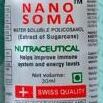In the pursuit of optimal athletic performance, athletes continually seek supplements that can offer them an edge in both training and recovery. Among the various options available, policosanol has emerged as a promising natural compound with potential benefits for enhancing performance and aiding recovery. This article delves into what policosanol is, its effects on heart health, and how it can be an integral part of an athlete’s regimen.
What is Policosanol?
Policosanol is a natural supplement derived from the waxy coating of sugarcane or other plant sources. Composed mainly of long-chain fatty alcohols, policosanol has received attention for its ability to positively influence cholesterol levels, cardiovascular health, and overall well-being. Originally studied for its lipid-lowering properties, recent research suggests that policosanol may have deeper implications for athletes, particularly concerning their cardiovascular health and performance.
Heart Health and Athletic Performance
For athletes, cardiovascular health is fundamental to achieving peak physical performance. A well-functioning heart and circulation system ensures that oxygen and nutrients reach muscles efficiently, which directly impacts endurance, strength, and recovery. Policosanol has been shown to have several benefits in this regard:
-
Cholesterol Regulation: High cholesterol can negatively impact cardiovascular health, leading to restricted blood flow and increased risk of heart disease. Policosanol has been demonstrated to lower LDL (bad) cholesterol levels while raising HDL (good) cholesterol, contributing to a healthier lipid profile. This balancing act can help athletes maintain optimal circulation and reduce the risk of cardiovascular issues.
-
Improved Blood Flow: Healthy blood flow is crucial for athletic performance, especially during high-intensity workouts and competitions. Policosanol may improve endothelial function, which helps in vasodilation—allowing blood vessels to widen and increase blood flow during workouts. Enhanced blood flow means better oxygen delivery to working muscles, leading to improved endurance and performance.
- Anti-Inflammatory Properties: Exercising, especially at high intensities, can lead to muscle fatigue and inflammation. Policosanol exhibits anti-inflammatory properties, which can help in reducing muscle soreness and speeding up recovery times. By lessening inflammation, athletes may experience improved performance in subsequent training sessions and events.
Recovery Enhancement
Recovery is a critical component of an athlete’s training program. Adequate recovery allows the body to repair itself, build muscle, and replenish energy stores. Incorporating policosanol may enhance recovery in several ways:
-
Reduced Muscle Damage: Research suggests that policosanol can help decrease oxidative stress and muscle damage following intense exercise sessions. By minimizing the extent of muscle injury, athletes can bounce back more quickly and resume training with less downtime.
-
Support for Energy Production: Policosanol has been linked to improving mitochondrial function, which plays a crucial role in energy production within cells. Enhanced mitochondrial performance can lead to better energy availability during workouts and faster recovery afterward.
- Stress Reduction: The physical stress of training can take a psychological toll as well. Policosanol may contribute to reduced stress levels, promoting relaxation and mental clarity, which are vital for recovery and overall performance balance.
Usage and Considerations
While policosanol is generally considered safe for most individuals when taken as directed, athletes should consult with a healthcare professional or sports nutritionist before introducing new supplements into their regimen. Dosing can vary based on individual needs and specific goals, and understanding the correct guidelines is essential.
It’s important to combine policosanol with a well-rounded diet, proper hydration, and an effective training regimen to reap the maximum benefits. Patience is key, as the effects of supplements like policosanol can take time to manifest, and they should be viewed as a complement to, not a replacement for, a dedicated athletic program.
Conclusion
For athletes looking to enhance their performance and speed up recovery, policosanol offers a compelling option rooted in improving heart health and overall well-being. By assisting in cholesterol management, promoting better blood flow, reducing muscle inflammation, and supporting energy production, policosanol could become a valuable part of any athlete’s supplement stack. As always, balancing supplementation with consistent training, nutrition, and recovery practices will maximize results, helping athletes to reach their full potential.
